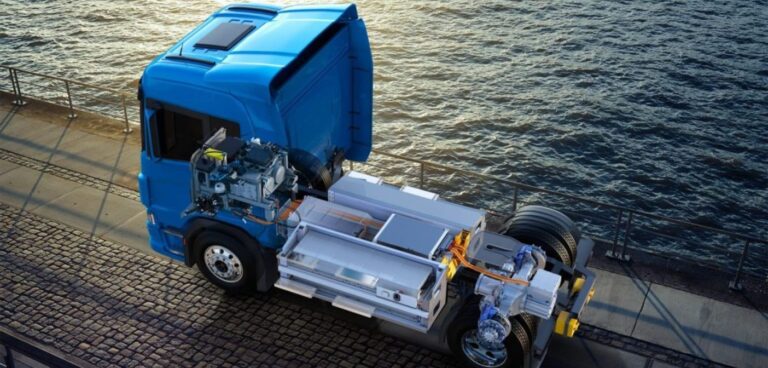Over £54m in UK government funding has been announced for three projects developing next-generation electric trucks and hydrogen-powered buses.
According to UK business secretary Kwasi Kwarteng, the funding for projects in Wales, England and Northern Ireland will help to secure nearly 10,000 UK jobs, save 45 million tonnes of carbon emissions, and further the country’s efforts to develop a sustainable supply chain for EV manufacturing by 2026.
Of the three projects, some £31.9 million has been awarded to the EPIC (Electric Powertrain Integration for Heavy Commercial Vehicles) project in Cwmbran, Wales to develop lightweight, smart electric propulsion systems to manage extreme levels of electrical power for heavy goods vehicles.
Led by Meritor, the The EPIC project integrates a motor, inverter, gearbox, differential and brakes in a single lightweight system to provide greater travel range and better energy efficiency for 4×2 and 6×2 vehicles up to 44 tonnes, coaches, off-highway and construction vehicles.
This funding will see Meritor’s existing air disc brake facility in Cwmbran house a new European eMobility Centre of Excellence with expanded laboratory and R&D facilities, as well as go toward the construction of a new technology centre in Scotland.
Some £11.3m will go to the e-MOTIF (e-axle with MOT or Inverter and Flywheel) project, led by Shield Manufacturing Technologies in Warwickshire, for the development and manufacture of lightweight energy-saving technology from motorsport to cut energy consumption and CO2 emissions in cars and vans. The funding here will lead to three new manufacturing centres opening across the UK.
Finally, some £11.2m will be used to develop and manufacture low-cost hydrogen fuel-cell technology for buses and create a hydrogen centre of excellence with Wrightbus in Ballymena, Northern Ireland.
Read more: Northern Ireland’s first hydrogen-powered double-deckers launched
Kwarteng said: “The UK is leading the world by developing cutting-edge technology that will help to tackle climate change and lead to a green, competitive future for our automotive supply chain.
“These projects will not only help accelerate the wider application of greener technology in lorries and buses, but will also help generate the high-skilled jobs to level up communities across the UK while ensuring we build back greener from the pandemic.”
The funding is being coordinated by the Advanced Propulsion Centre (APC), which supports the development of low carbon emission technologies for cars, buses, heavy goods vehicles, and vans.
Ian Constance, CEO at the APC, said: “We are delighted to have guided the latest investment of more than £54m in the development and production of innovative powertrains to further accelerate the transition of the automotive sector to a net-zero future.
“The funding will enable the UK to apply its world-class innovation and experience in electrification of vehicles across the supply chain in Great Britain and Northern Ireland.”





